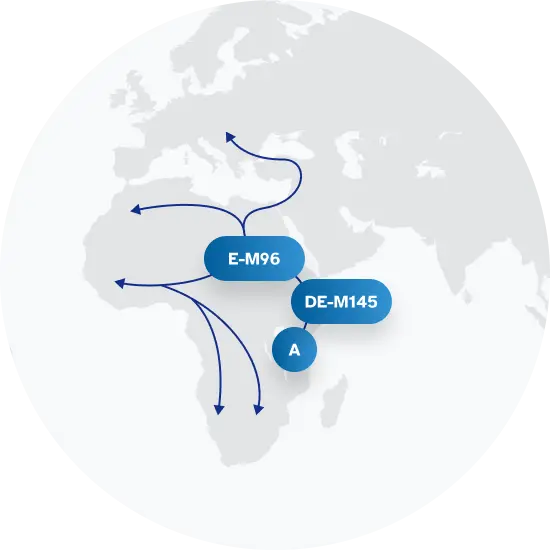Explore the Family Name Lucia
How common is the last name Lucia in the United States?
According to the Decennial U.S. Census, the popularity of the surname Lucia has experienced a slight decline from 2000 to 2010. In 2000, Lucia ranked as the 7814th most popular surname in the United States. By 2010, it had dropped to the 8217th spot, representing a change of -5.16%. Despite the drop in rank, the overall count of people with the surname Lucia actually increased by 2.88% during that same time period, from 3925 in 2000 to 4038 in 2010. The proportion of individuals with this surname per 100,000 people also decreased by 5.52%, from 1.45 in 2000 to 1.37 in 2010.
| 2000 | 2010 | Change | |
|---|---|---|---|
| Rank | #7,814 | #8,217 | -5.16% |
| Count | 3,925 | 4,038 | 2.88% |
| Proportion per 100k | 1.45 | 1.37 | -5.52% |
Race and Ethnicity of people with the last name Lucia
The ethnicity data from the Decennial U.S. Census shows that the majority of people with the surname Lucia identify as White, though there was a slight drop in this group from 92.97% in 2000 to 90.52% in 2010. The percentage of Lucias identifying as Hispanic saw an increase of 43.75%, moving from 4.48% in 2000 to 6.44% in 2010. Similarly, those identifying as Asian/Pacific Islander and Black also saw increases, at 43.75% and 25.00% respectively. Interestingly, the percentage of Lucias identifying as American Indian and Alaskan Native saw the largest increase, rising by 76.32% over the decade. On the other hand, the percentage of individuals with the surname Lucia identifying with two or more races saw a decrease of -12.82%.
| 2000 | 2010 | Change | |
|---|---|---|---|
| White | 92.97% | 90.52% | -2.64% |
| Hispanic | 4.48% | 6.44% | 43.75% |
| Two or More Races | 1.17% | 1.02% | -12.82% |
| Asian/Pacific Islander | 0.64% | 0.92% | 43.75% |
| American Indian and Alaskan Native | 0.38% | 0.67% | 76.32% |
| Black | 0.36% | 0.45% | 25% |
Lucia ancestry composition
23andMe computes an ancestry breakdown for each customer. People may have ancestry from just one population or they may have ancestry from several populations. The most commonly-observed ancestry found in people with the surname Lucia is British & Irish, which comprises 30.0% of all ancestry found in people with the surname. The next two most common ancestries are Italian (22.8%) and French & German (19.1%). Additional ancestries include Eastern European, Spanish & Portuguese, Greek & Balkan, Ashkenazi Jewish, and Indigenous American.
Ready to learn more about your ancestry? Get the most comprehensive ancestry breakdown on the market by taking our DNA test. Shop 23andMe
| ANCESTRY BREAKDOWN | COMPOSITION |
|---|---|
| British & Irish | 30.0% |
| Italian | 22.8% |
| French & German | 19.1% |
| Other | 28.1% |

Possible origins of the surname Lucia
Your DNA provides clues about where your recent ancestors may have lived. Having many distant relatives in the same location suggests that you may all share common ancestry there. Locations with many distant relatives can also be places where people have migrated recently, such as large cities. If a large number of individuals who share your surname have distant relatives in a specific area, it could indicate a connection between your surname and that location, stemming from either recent ancestral ties or migration.
Based on 23andMe data, people with last name Lucia have recent ancestry locations in the United Kingdom of Great Britain and Northern Ireland and Ireland.
| RECENT ANCESTRY Location | Percentage |
|---|---|
| Greater Manchester, United Kingdom | 64.10% |
| West Midlands, United Kingdom | 64.10% |
| Greater London, United Kingdom | 64.10% |
| Lancashire, United Kingdom | 63.20% |
| Tyne And Wear, United Kingdom | 62.40% |
What Lucia haplogroups can tell you
Haplogroups are genetic population groups that share a common ancestor on either your paternal or maternal line. These paternal and maternal haplogroups shed light on your genetic ancestry and help tell the story of your family.
The top paternal haplogroup of people with the surname Lucia is E-V13, which is predominantly found among people with European ancestry. Haplogroup E-V13 is descended from haplogroup E-M96. Other common haplogroups include R-Z19 and R-P311, which are predominantly found among people with European and European ancestry. Other surnames with similar common haplogroups are: Hubbard, Sutton, Acevedo, Staley, Schaaf, Blackburn, Kirkpatrick, Moyer, Kempf, Genovese.
The most common maternal haplogroups of people with Lucia surname are: H1, H, J1. These most commonly trace back to individuals of European ancestry.
 Paternal Haplogroup Origins E-M96
Paternal Haplogroup Origins E-M96
Your paternal lineage may be linked to early Balkan migrants
Haplogroup E1b1b1a1b1a migrated in large numbers from the Balkans into Europe about 4,500 years ago, triggered by the beginning of the Balkan Bronze Age. During this migration, members of haplogroup E1b1b1a1b1a mainly followed rivers connecting the southern Balkans to northern-central Europe. Technological leaps often cause lineages to grow dramatically in numbers and in geographic range. The development of Bronze technology may have given men in haplogroup E1b1b1a1b1a a competitive advantage over other men, causing haplogroup E1b1b1a1b1a to proliferate and become widespread.
Your maternal lineage may be linked to Marie Antoinette
Because it is so dominant in the general European population, haplogroup H also appears quite frequently in the continent's royal houses. Marie Antoinette, an Austrian Hapsburg who married into the French royal family, inherited the haplogroup from her maternal ancestors. So did Prince Philip, Duke of Edinburgh, whose recorded genealogy traces his female line to Bavaria. Scientists also discovered that famed 16th century astronomer Nicolaus Copernicus traced his maternal lineages to haplogroup H.

What do people with the surname Lucia have in common?
Spoiler alert: it's complicated. People with the same last name are usually no more genetically similar than a randomly sampled group of people from the same population. That said, people with the same surname are more likely to have similar ancestries than randomly sampled individuals. The reason is the tendency of people with similar cultural or geographical backgrounds to preferentially mate with one another. That's why people who share a surname may be more likely to share traits and tendencies in common than people within the general population. Check out the percentages below to see the prevalences of tastes, habits, and traits of people with your surname compared with prevalences among 23andMe users.
Preferences
Traits
Habits
Wellness
Are health conditions linked to the last name Lucia?
The short answer is that, if there is an association between surname and health, it's usually more about your ancestry than your name. Individuals with a given surname are no more genetically similar than the general population but often have similar ancestries. The populations of people associated with those shared ancestries often have sets of genetic variations, also known as alleles, in common. Some of those alleles are associated with a greater likelihood of developing certain diseases.
Disease variant frequency by ancestry
Disease allele frequencies in populations associated with the surname Lucia are shown below. Important Note: not everyone with a disease allele will develop these health condition

















